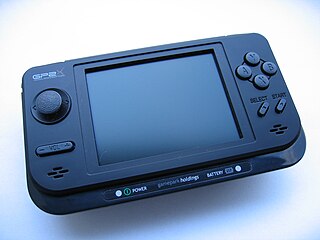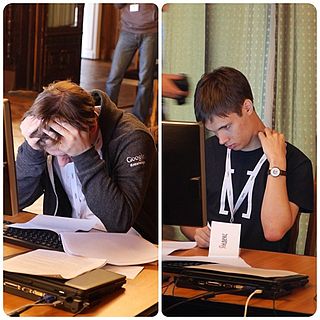Related Research Articles

An operating system (OS) is system software that manages computer hardware and software resources, and provides common services for computer programs.

An embedded system is a computer system—a combination of a computer processor, computer memory, and input/output peripheral devices—that has a dedicated function within a larger mechanical or electronic system. It is embedded as part of a complete device often including electrical or electronic hardware and mechanical parts. Because an embedded system typically controls physical operations of the machine that it is embedded within, it often has real-time computing constraints. Embedded systems control many devices in common use. In 2009, it was estimated that ninety-eight percent of all microprocessors manufactured were used in embedded systems.
Topcoder is a crowdsourcing company with an open global community of designers, developers, data scientists, and competitive programmers. Topcoder pays community members for their work on the projects and sells community services to corporate, mid-size, and small-business clients. Topcoder also organizes the annual Topcoder Open tournament and a series of smaller regional events.

The GP2X is a Linux-based handheld video game console and portable media player developed by South Korean company GamePark Holdings. It was released on November 10, 2005, in South Korea only.

A multi-core processor is a microprocessor on a single integrated circuit with two or more separate processing units, called cores, each of which reads and executes program instructions. The instructions are ordinary CPU instructions but the single processor can run instructions on separate cores at the same time, increasing overall speed for programs that support multithreading or other parallel computing techniques. Manufacturers typically integrate the cores onto a single integrated circuit die or onto multiple dies in a single chip package. The microprocessors currently used in almost all personal computers are multi-core.
Norway participated in the Eurovision Song Contest 2006 with the song "Alvedansen" written by Kjetil Fluge, Christine Guldbrandsen and Atle Halstensen. The song was performed by Christine Guldbrandsen. The Norwegian broadcaster Norsk rikskringkasting (NRK) organised the national final Melodi Grand Prix 2006 in order to select the Norwegian entry for the 2006 contest in Athens, Greece. 18 entries competed in the national final that consisted of three semi-finals, a Last Chance round and a final. Eight entries ultimately qualified to compete in the final on 4 February 2006 where the winner was determined over two rounds of public televoting. The top four entries in the first round of voting advanced to the competition's second round—the Gold Final. In the second round of public televoting, "Alvedansen" performed by Christine Guldbrandsen was selected as the winner with 77,568 votes.
Poland participated in the Eurovision Song Contest 2004 with the song "Love Song" written by Tatiana Okupnik and Paweł Rurak-Sokal. The song was performed by the band Blue Café. The Polish broadcaster Telewizja Polska (TVP) organised the national final Krajowe Eliminacje do Konkursu Piosenki Eurowizji 2004 in order to select the Polish entry for the 2004 contest in Istanbul, Turkey. The national final took place on 24 January 2004 and featured fifteen entries. "Love Song" performed by Blue Café was selected as the winner after gaining the most votes from the public with 57,125 votes.
This article describes the selection process, by country, for entrance into the International Mathematical Olympiad.
Poland participated in the Eurovision Song Contest 2007 with the song "Time to Party" written by Kamil Varen, David Junior Serame and Mateusz Krezan. The song was performed by the duo The Jet Set. The Polish broadcaster Telewizja Polska (TVP) organised the national final Piosenka dla Europy 2007 in order to select the Polish entry for the 2007 contest in Helsinki, Finland. The national final took place on 3 February 2007 and featured ten entries. "Time to Party" performed by The Jet Set was selected as the winner after gaining the most public votes.
MathWorks Math Modeling Challenge is a mathematical modeling competition open to high schools in the U.S. and schools with sixth form students in England and Wales. It is sponsored by MathWorks based in Boston and organized by the Society for Industrial and Applied Mathematics (SIAM) based in Philadelphia.

The Android Developer Challenge (ADC) was launched by Google in 2008, with the aim of providing awards for high-quality mobile applications built on the Android platform. In November 2009, the winners of Android Developers Challenge II were selected after two rounds of scoring by thousands of Android users as well as an official panel of judges. The overall winners of ADC II were SweetDreams, What the Doodle!? and WaveSecure.
Norway participated in the Eurovision Song Contest 2004 with the song "High" written by Thomas Thörnholm, Lars Andersson and Danne Attlerud. The song was performed by Knut Anders Sørum. The Norwegian broadcaster Norsk rikskringkasting (NRK) organised the national final Melodi Grand Prix 2004 in order to select the Norwegian entry for the 2004 contest in Istanbul, Turkey. Twelve entries competed in a show that took place on 6 March 2004 and the winner was determined over two rounds of public televoting. The top four entries in the first round of voting advanced to the competition's second round—the Gold Final. In the second round of public televoting, "High" performed by Knut Anders Sørum was selected as the winner with 82,427 votes.

Competitive programming or sport programming is a mind sport involving participants trying to program according to provided specifications. The contests are usually held over the Internet or a local network. Competitive programming is recognized and supported by several multinational software and Internet companies, such as Google and Meta.
The 2016 Cyber Grand Challenge (CGC) was a challenge created by The Defense Advanced Research Projects Agency (DARPA) in order to develop automatic defense systems that can discover, prove, and correct software flaws in real-time.
Fiscalization is a system designed to avoid retailer fraud in the retail sector. It involves using special cash registers or software to accurately report sales, helping prevent tax evasion. Fiscalization laws about cash registers have been introduced in various countries to control the grey economy by ensuring that all retail transactions are properly recorded and taxed, thereby reducing the possibility of fraud.
Poland participated in the Eurovision Song Contest 2018 with the song "Light Me Up" written by Andrzej Gromala, Lukas Meijer, Mahan Moin and Christian Rabb. The song was performed by Gromee featuring Lukas Meijer. The Polish broadcaster Telewizja Polska (TVP) organised the national final Krajowe Eliminacje 2018 in order to select the Polish entry for the 2018 contest in Lisbon, Portugal. The national final took place on 3 March 2018 and featured ten entries. "Light Me Up" performed by Gromee featuring Lukas Meijer was selected as the winner after gaining the most points following the combination of votes from a five-member jury panel and a public vote.

Topcoder Open (TCO) was an annual design, software development, data science and competitive programming championship organized by Topcoder, and hosted in different venues around US. In the first two years, 2001 and 2002, the tournament was titled TopCoder Invitational.
Poland hosted and won the Junior Eurovision Song Contest 2019, held in Gliwice. The country's artist and song was selected through Szansa na sukces, organised by the Polish national broadcaster Telewizja Polska (TVP).
The 2019–20 Polish Cup was the sixty-sixth season of the annual Polish football knockout tournament. It began on 7 August 2019 with the first matches of the preliminary round and ended with the final at Arena Lublin. The 2019–20 edition of the Polish Cup was sponsored by Totolotek, making the official name Totolotek Puchar Polski. Winners of the competition qualified for the qualifying round of the 2020–21 UEFA Europa League.
Poland participated in the Eurovision Song Contest 2021 with the song "The Ride" written by Joakim Övrenius, Thomas Karlsson, Clara Rubensson and Johan Mauritzson. The song was performed by Rafał. In March 2021, the Polish broadcaster Telewizja Polska (TVP) announced that the Polish entry for the 2021 contest in Rotterdam, Netherlands would be selected through an internal selection. Rafał and the song "The Ride" were announced as the Polish entry on 12 March 2021 during the TVP2 programme Pytanie na śniadanie.
References
- ↑ "Deadline 24". Future Processing. Archived from the original on 21 November 2018.
- ↑ "Deadline24 — Prehistory". deadline24.pl.
- 1 2 "Deadline 24". Future Processing (in Polish). Archived from the original on 22 October 2019.
- ↑ "Deadline24". ChallengeRocket.
- ↑ "Gennady Korotkevich Wins The Deadline24 Contest". news.ifmo.ru.
- 1 2 "Команда ХНУРЭ успешно выступила в финале соревнований "Deadline24" | ХНУРЭ - Харьковский национальный университет радиоэлектроники". nure.ua. April 18, 2018.